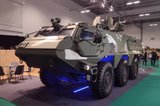Germany orders more Boxer vehicles
Rheinmetall and Krauss-Maffei Wegmann (KMW) joint venture Artec will supply Germany with additional Boxer armoured fighting vehicles under a $516 million order announced on 18 December.
The contract, which was awarded by Occar on behalf of the German defence procurement agency, calls for Artec to deliver 131 Boxer vehicles in armoured personnel carrier (APC) configuration. Delivery will take place in 2017-2020.
Germany made its initial Boxer order in 2006 for 272 vehicles. These vehicles are configured for a range of roles, including command and control, medevac and driver training vehicles as well as APCs capable of transporting a complete infantry section/squad. Deliveries under this order are ongoing and are set to complete in March 2016.
The Boxer is a highly protected 8x8 tactical vehicle. Its composite add-on armour is designed to deliver protection against landmines, improvised explosive devices and ballistic fire. The highly mobile vehicle is powered by a 530kW (720HP) MTU turbo diesel engine. Weighing in at up to 36.5 tonnes with a full combat load, the vehicle is capable of attaining a top speed of 103km/h.
In the section/squad APC configuration, the Boxer serves as a ‘mother ship’ for up to ten troops. It is equipped with a remotely operated FLW 200 light weapon station featuring a 40mm automatic grenade launcher or 12.7mm heavy machine gun.
Related Equipment in Defence Insight
More from Land Warfare
-
![US DoD task force’s DroneHunter acquisition lays groundwork for Replicator 2 CUAS strategy]()
US DoD task force’s DroneHunter acquisition lays groundwork for Replicator 2 CUAS strategy
As the US Department of Defense looks to counter the growing threat of uncrewed aerial systems to improve homeland security, the DroneHunter acquisition could point to future commercial innovation.
-
![Norway opts for Hanwha’s Chunmoo for long-range fires under $2 billion deal]()
Norway opts for Hanwha’s Chunmoo for long-range fires under $2 billion deal
The selection of Hanwha’s K239 Chunmoo long-range precision fires system, with a contract expected to be signed on 30 January, makes Norway the second European country to choose the system. It is expected an operational system will be in service within four years.
-
![Layered protection: How air defence is adapting to rising drone and missile threats (podcast)]()
Layered protection: How air defence is adapting to rising drone and missile threats (podcast)
A surge in aerial threats – from advanced missiles to low-cost drones – is reshaping the way militaries approach air defence, driving demand for flexible, multi-layered solutions.























